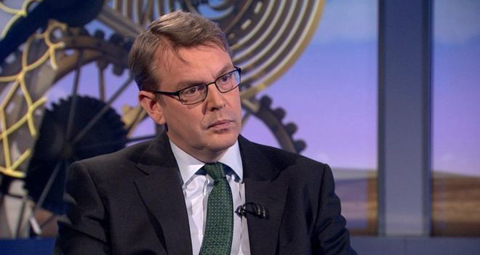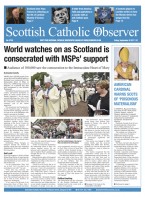May 12 | ![]() 0 COMMENTS
0 COMMENTS ![]() print
print

Sectarian chant is a stupid relic of the past
Rangers Fan and Conservative MSP Adam Tomkins despairs at the anti-Catholic bigotry of some of his fellow supporters.
When I moved from England to Glasgow in 2003 there was little that surprised me about my new home, despite the fact that I’d not lived in Scotland before. Even the rain and the shortness of the winter day were familiar. My sister had lived for a while near Killin, and we’d had several family holidays in Scotland whilst we were growing up. But one weekend morning my wife and I were awakened from our lazy lie-in by a sound I’d never heard in my three and a half decades living south of the border. From our city-centre flat we could hear the drums and pipes of an Orange Walk, en route from Blythswood Square, down St Vincent Street, and on into George Square.
I gawped dumbfounded from our bedroom window. I’d seen this on the television news—but only ever from Northern Ireland. In my Sassenach naivety I had no idea that this occurrence took place in west central Scotland too.
In England I’d become obsessed by football. I had an Arsenal season ticket and had travelled all over Europe watching Dennis Bergkamp, Ian Wright and Thierry Henry. In Glasgow, by contrast, I had no dog in the Old Firm fight. At least, not until my eldest son caught the football bug in his first year of primary school. His new mates were Rangers fans, and he wanted a piece of the Ibrox action for himself. So off we trooped.
After years away it felt wonderful to be back in a proper football crowd again. The camaraderie. The insane anger at the referee. The frustration at a pass misplaced or a chance gone begging. The burst of joyous relief at a goal scored. And, of course, the singing. Arsenal’s old ground, Highbury, had never been one of England’s noisiest stadiums, but my seats were near the away support and there was always plenty of banter. At Ibrox, some of the songs were familiar but there were also a whole lot more that were not.
I cannot imagine what it is like to support a football team that does not have a bitter rival across town. The Arsenal v Tottenham North London rivalry dates back to the First World War. There were riots in the 1920s and one match between the sides was so vicious that subsequent fixtures had to be played behind closed doors.
There is a sectarian element to the North London rivalry. Tottenham is a club with a proud history of support from the local Jewish community, and ‘yid’ is a word which certain Spurs fans use to describe themselves and, in the hands of an angry Arsenal fan, an ugly racist insult.
One of my many frustrations with the Glasgow derby is that so many commentators in Scotland assume that the Rangers v Celtic rivalry is unique. You need only listen to what Liverpool and Manchester City fans sing about Manchester United to know that it is not. Some of the songs are brutal, callous, and have as little connection with football as snowmen do with the desert.
But even if the Glasgow derby is not unique, in British terms at least it is distinct. Nowhere else in Britain does competition between football clubs collide with politics in the way Celtic v Rangers does in Glasgow. There are other European examples (think of Castilian Real Madrid v Catalonia’s Barcelona, or of Ajax Amsterdam’s association with Dutch Jewry and resistance to the Nazis, for example).
Historically, as everyone—even a naive Sassenach!—knows, Celtic and Rangers fans often divided along sectarian lines. And, again historically, this divide was reflected in matters far more serious than allegiance to one football club or another, with entrenched discrimination in the workplace taking decades to dissipate and leaving wounds which even now are not fully healed.
In the 21st century the Glasgow derby is important not because it represents a division that continues to tarnish west-central Scottish society generally, but because its worst elements stand out, as an artefact (or relic) of an age which, for the most part, we have moved on from.
Thus, when Rangers fans are caught on tape (as some were two weeks ago) drunkenly chanting about how much they hate Roman Catholics, my reaction is not despair at the grinding injustice of modern, discriminatory Scotland, but shock that even now there are people who find this bigotry acceptable. Their singing is an embarrassing monument to the cruel stupidity of the past, not a sign of the times.
What worries me more, looking forward, is whether the new divide of Scottish politics is somehow being mapped onto (or hijacked by) the Glasgow football divide. Not all Rangers fans voted No to independence, and not all Celtic fans voted Yes. But you’d be forgiven for thinking otherwise, especially if you spend too much time on Twitter. There is more than enough for Rangers and Celtic fans to argue and to brag about on the pitch. They really do not need political divisions, whether old or new, to add to their sound and fury.
Adam Tomkins is a Conservative MSP for the Glasgow region and a professor of law at the University of Glasgow. He writes here in a personal capacity











